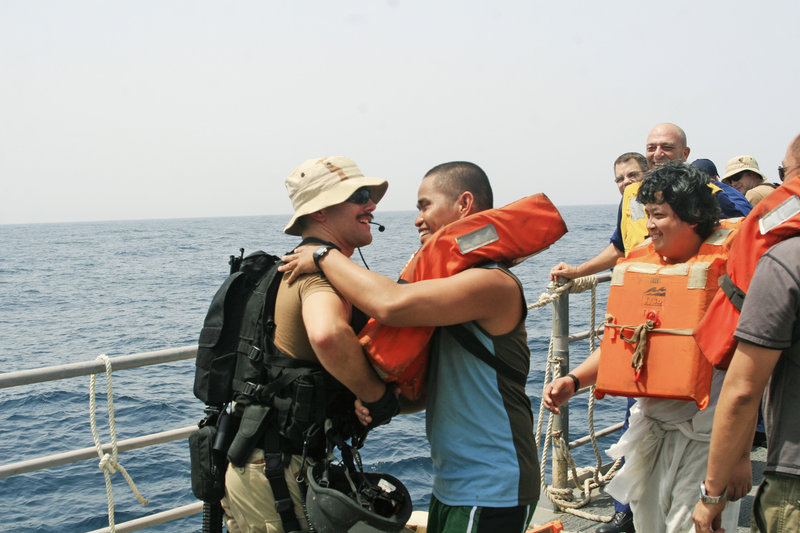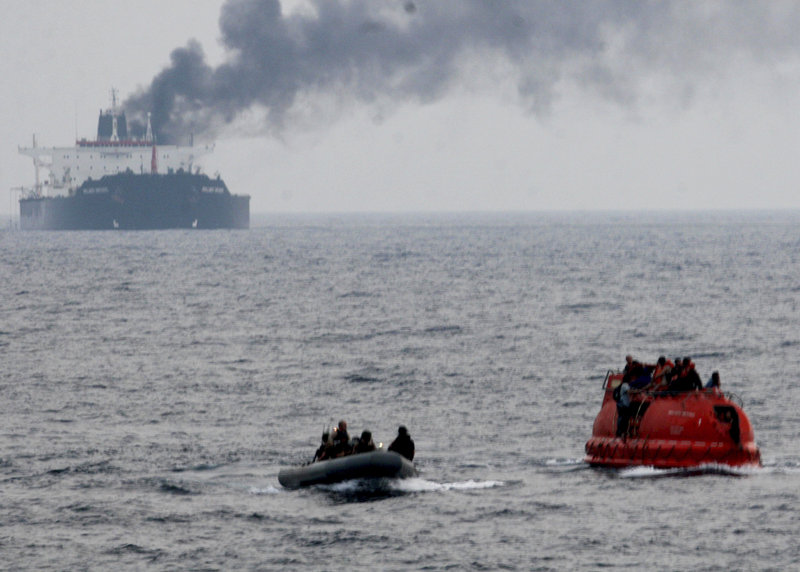A 2006 Bonny Eagle graduate who joined the Navy right out of high school found himself amid a dramatic piracy rescue last month off the coast of Yemen.
Hollis native Lucas Alderette, an electronics technician serving aboard the guided-missile cruiser USS Philippine Sea, said a pre-dawn alarm led to the rescue of the crew of the Brillante Virtuoso, an oil tanker that had been attacked by pirates in the Gulf of Aden and set ablaze on July 6.
“When we showed up, it was of course still very dark out, but the tanker was easily visible because large sections were on fire, with occasional fireballs — almost like an action movie, but from far away,” Alderette wrote in a recent email.
“The actual pirates had been gone long before we arrived on scene. It’s just a business for them, so if something starts going bad and it’s easier to leave than to try to get what they want, they’ll take the easier route,” he wrote.
Alderette and 13 others from his ship rescued 25 crew members from a lifeboat and one who was still aboard the Brillante Virtuoso, according to Navy spokesman Lt. Frederick Martin.
The pirates posed as authorities when boarding the 900-foot oil tanker while it was anchored off the coast of Yemen. The vessel, carrying 1 million barrels of fuel oil from Ukraine to China, had stopped to pick up unarmed guards.
The vessel’s owner, Suez Fortune Investments Ltd., issued a statement describing the attack. The company said the gunmen came aboard, ordered the crew to start the engines and sail to Somalia. They then ransacked parts of the ship, including the bridge and the engine room, before leaving amid threats to return if there were “any moves against them.”
The fire started in the engine room, but the cause is unknown. Early reports that it was caused by a rocket-propelled grenade turned out to be false, according to a surveyor’s report. The crew was forced to abandon ship.
The USS Philippine Sea took the rescued sailors to a Yemeni coast guard vessel and the Brillante Virtuoso was towed away by two tugs. No fuel oil was spilled, officials said.
The USS Philippine Sea — built at Bath Iron Works — is part of a multinational anti-piracy armada patrolling the waters off East Africa. Alderette said he volunteered to be part of this kind of anti-piracy crew, known as a Visit, Board, Search and Seizure team, or VBSS.
“What little kid has watched an action movie and not wanted to be on one of those cool-guy teams?” Alderette wrote.
Training was tough, but exciting, he said. It included three-week VBSS training, a two-week security course and a two-week basic weapons familiarization course.
Alderette said he knew he was going to join the military when he was still in high school.
“I was one of those kids who everyone knew was going to sign up, it was just a question of which branch,” he wrote.
Piracy has plagued the shipping channels off East Africa for years. Pirates have collected hundreds of millions of dollars a year by working in an organized fashion to seize large vessels and hold them for ransom.
The situation got wide attention in the United States in 2009 when pirates kidnapped a U.S. citizen during the hijacking of the Maersk Alabama, the first pirate attack on a U.S.-flagged vessel in about 200 years. The hijacking ended when Navy sharpshooters killed two pirates and rescued the ship’s captain, who was held hostage for five days.
Since then, anti-piracy efforts have expanded, but the attacks have continued. In February, four Americans on a yacht were killed by Somali pirates.
The U.S. Navy, along with navies from dozens of other countries, carry out patrols in the Gulf of Aden, the Arabian Sea, the Somali Basin, the Southern Red Sea and the Indian Ocean in an attempt to disrupt the efforts of pirates to hijack merchant ships, Martin said.
“The merchant ships are also given instruction and useful advice to help protect themselves from being hijacked,” Martin wrote in an email. “Part of that advice is to report anything suspicious they see. When a merchant ship reports that they are being followed or approached by what they believe is a suspected pirate skiff, the military organizations in the area will try to get a warship to intercept them.”
According to the United Nations, there were 286 piracy-related incidents off the coast of Somalia in 2010, resulting in 67 hijacked ships, with 1,130 seafarers on board.
In February 2011, there were 714 sailors being held for ransom aboard 30 ships along the Somali coast.
Bloomberg News contributed to this report.
Staff Writer Ellie Cole can be contacted at 791-6359 or at:
ecole@pressherald.com
Send questions/comments to the editors.




Success. Please wait for the page to reload. If the page does not reload within 5 seconds, please refresh the page.
Enter your email and password to access comments.
Hi, to comment on stories you must . This profile is in addition to your subscription and website login.
Already have a commenting profile? .
Invalid username/password.
Please check your email to confirm and complete your registration.
Only subscribers are eligible to post comments. Please subscribe or login first for digital access. Here’s why.
Use the form below to reset your password. When you've submitted your account email, we will send an email with a reset code.